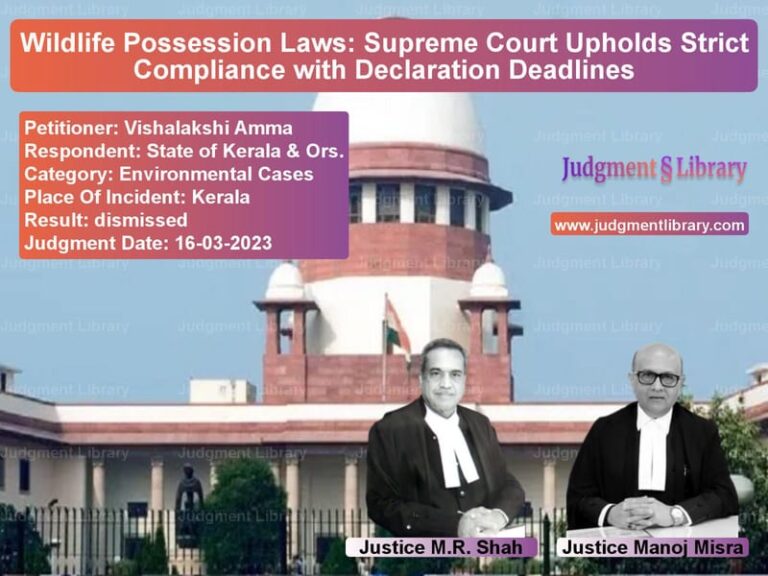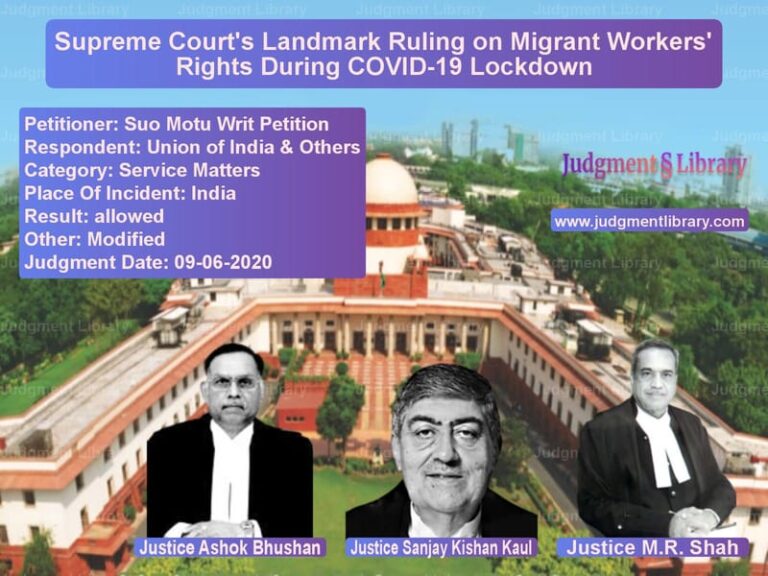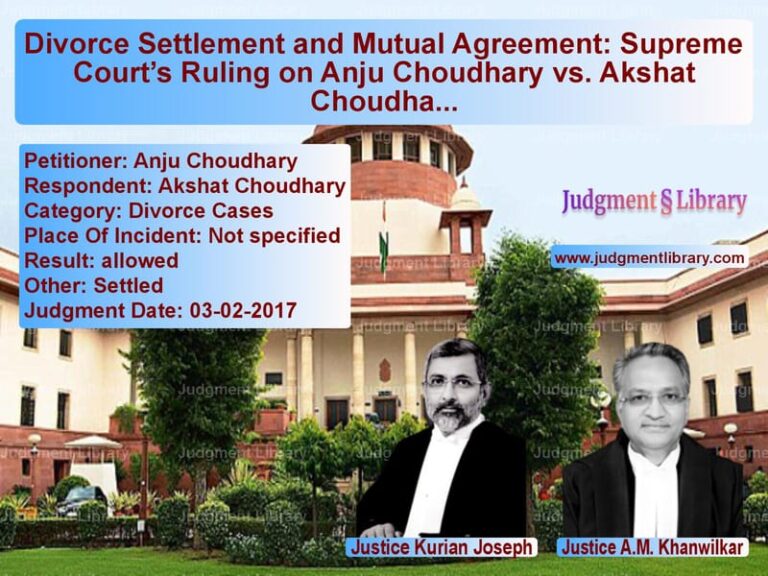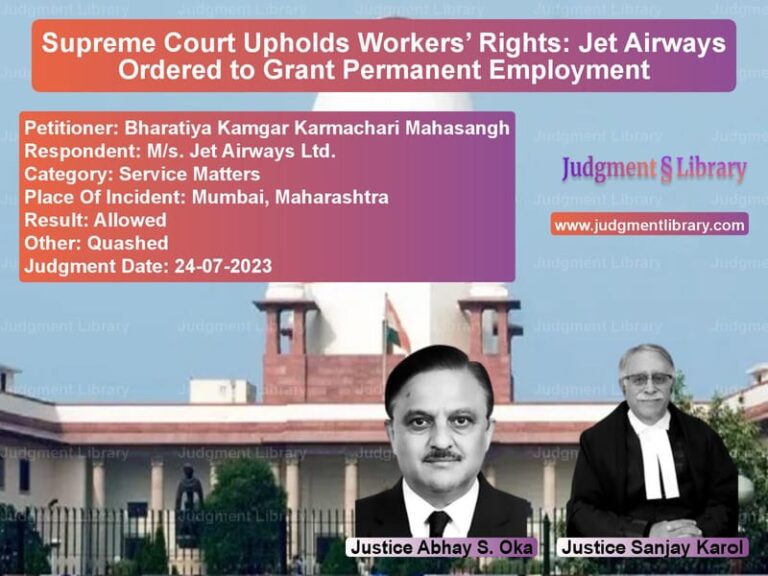Speedy Trial in POCSO Cases: Supreme Court’s Landmark Directions
The case of Alakh Alok Srivastava v. Union of India & Ors. highlights the urgent need for speedy trials in cases under the Protection of Children from Sexual Offences (POCSO) Act, 2012. The Supreme Court issued significant directions to ensure the prompt and effective adjudication of such cases, focusing on child-friendly trial procedures, the establishment of Special Courts, and stricter monitoring mechanisms.
Background of the Case
This writ petition was filed in response to two major concerns:
- The medical treatment of an eight-month-old female child who had been a victim of sexual assault.
- The need for speedy trials and better monitoring of POCSO cases to ensure justice for child victims.
While the first concern was addressed through multiple interim orders directing immediate medical attention and financial aid for the child, the second concern led to a detailed analysis of the delays in POCSO cases and the necessity of reform.
Legal Issues Addressed
The Supreme Court considered the following questions:
- How can the trial process for POCSO cases be expedited?
- What measures should be implemented to ensure child-friendly trial proceedings?
- What steps can be taken to monitor and regulate the disposal of POCSO cases in a time-bound manner?
Arguments by the Petitioner
The petitioner, Alakh Alok Srivastava, submitted that:
- Despite the stringent provisions of the POCSO Act, cases were taking years to conclude due to delays in investigation and trial.
- The large pendency of cases was a serious concern, with over 30,000 cases pending in states like Uttar Pradesh and 10,000 cases in Madhya Pradesh alone.
- The lack of Special Courts and trained judicial officers led to prolonged trials, undermining the very purpose of the POCSO Act.
- In many cases, child victims and their families suffered additional trauma due to the delays in judicial proceedings.
Arguments by the Respondents
The Union of India, represented by Additional Solicitor General Pinky Anand, contended that:
- Steps were being taken to improve the judicial infrastructure and ensure timely disposal of POCSO cases.
- The government had implemented several schemes to provide financial assistance and rehabilitation to child victims.
- State governments were being encouraged to set up Special Courts and appoint Special Public Prosecutors to handle POCSO cases.
Supreme Court’s Observations
The Supreme Court recognized the gravity of the situation, stating:
“The POCSO Act has been legislated keeping in view the fundamental concept under Article 15 of the Constitution that empowers the State to make special provisions for children and also Article 39(f), which provides that the State shall secure that children are given opportunities and facilities to develop in a healthy manner and in conditions of freedom and dignity.”
The Court referred to the Statement of Objects and Reasons of the POCSO Act, which emphasizes the need for child-friendly legal processes and the importance of speedy justice.
“The legislature has commanded the State to take various steps at many levels so that the child is protected and the trial is appropriately conducted.”
Key Directions Issued by the Supreme Court
To address the issues raised, the Supreme Court issued the following directions:
1. Establishment of Special Courts
- All High Courts must ensure that cases under the POCSO Act are tried exclusively in Special Courts.
- Special Courts should be presided over by judges who are trained and sensitized to handle child sexual abuse cases.
2. Fast-Tracking of POCSO Cases
- Special Courts must expedite POCSO trials by avoiding unnecessary adjournments.
- State governments must ensure that investigations are completed within the prescribed time limits.
- Trials should be concluded as early as possible, with due regard to the statutory mandate of completing them within one year.
3. Monitoring and Supervision by High Courts
- Chief Justices of all High Courts must form committees of three judges to monitor the progress of POCSO cases.
- These committees will oversee trial timelines, judicial conduct, and case management strategies to avoid undue delays.
4. Role of Law Enforcement Agencies
- State Directors General of Police must form Special Task Forces to ensure proper investigation and timely filing of charge sheets.
- Police must coordinate with prosecutors and courts to ensure the timely presence of witnesses.
5. Ensuring a Child-Friendly Court Environment
- Special Courts must ensure that child victims are treated with dignity and are not subjected to repeated interrogation.
- Children should be provided with adequate psychological support and protection.
- Legal aid must be made available to child victims and their families to help them navigate the legal process.
Final Judgment
The Supreme Court directed all states and High Courts to implement the above measures immediately. The Court stressed the importance of expediting trials while maintaining a sensitive and victim-friendly approach:
“The objective of the POCSO Act is to protect children from sexual offenses and ensure their dignity. Any delay in justice delivery compounds their trauma. Courts and law enforcement agencies must prioritize these cases.”
Implications of the Judgment
This judgment is a crucial step towards ensuring justice for child victims of sexual offenses. The key takeaways include:
- Increased judicial accountability in handling POCSO cases.
- Faster disposal of cases to prevent prolonged trauma for victims.
- Stronger monitoring mechanisms by High Courts to ensure compliance.
- Better coordination between police, prosecutors, and courts.
Conclusion
The Supreme Court’s directions in Alakh Alok Srivastava v. Union of India mark a significant development in the enforcement of the POCSO Act. By mandating Special Courts, fast-tracking trials, and ensuring child-friendly legal procedures, the judgment reaffirms the commitment to protecting children from sexual offenses and delivering justice efficiently.
Petitioner Name: Alakh Alok Srivastava.Respondent Name: Union of India & Ors..Judgment By: Justice Dipak Misra, Justice A.M. Khanwilkar, Justice D.Y. Chandrachud.Place Of Incident: India.Judgment Date: 01-05-2018.
Don’t miss out on the full details! Download the complete judgment in PDF format below and gain valuable insights instantly!
Download Judgment: Alakh Alok Srivastav vs Union of India & Ors Supreme Court of India Judgment Dated 01-05-2018.pdf
Direct Downlaod Judgment: Direct downlaod this Judgment
See all petitions in Juvenile Justice
See all petitions in Legal Malpractice
See all petitions in Judgment by Dipak Misra
See all petitions in Judgment by A M Khanwilkar
See all petitions in Judgment by Dhananjaya Y Chandrachud
See all petitions in allowed
See all petitions in Modified
See all petitions in supreme court of India judgments May 2018
See all petitions in 2018 judgments
See all posts in Criminal Cases Category
See all allowed petitions in Criminal Cases Category
See all Dismissed petitions in Criminal Cases Category
See all partially allowed petitions in Criminal Cases Category







